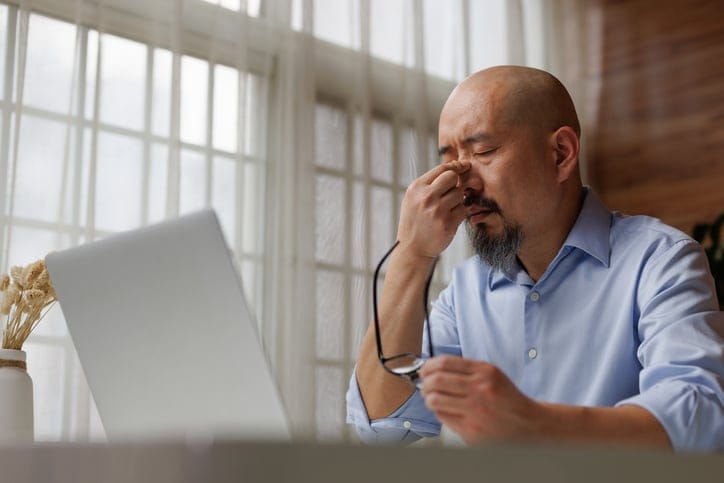Hustling hard is generally seen to be a good thing, but ambitious people tend to experience a whole host of adverse side effects. According to a new study, putting in more hours at your job is more likely to make you go bald prematurely. Uh oh!
The science is clear: too much work is bad for your hairline.
The study came from Sungkyunkwan University School of Medicine in South Korea and relied on research from 13,000 men aged between 20 and 59 from 2013 to 2017. They were split into groups based on their number of working hours and other lifestyle factors such as smoking, income, and relationship status were also considered. Bottom line? Too much work is bad for you.
It gets really bad when you work more than 52 hours.
Full-time jobs often require about 40 hours a week at the office, but many people end up putting in way more than that. Whether you’re staying late to get ahead, to try and earn a promotion, or to get a big project finished, perpetually staying late won’t do your hairline any favors.
Want a partner? Attract love with the power of your mind.
Sweetn is a new research-based startup that shows you how to call love into your life with the power of your mind. Take our quiz, and try our tools—they can transform your energy and your love life in a few weeks. Just click here.
A small caveat: The study was only on men.
“The results of this study demonstrate that long working hours is significantly associated with the increased development of alopecia in male workers,” said lead study author Kyung-Hun Son. “Limitation of working hours in order to prevent alopecia development may be more necessary from younger workers, such as those in the 20s and 30s, at which hair loss symptoms start to appear.”
Still, it could happen to women. Women spend a lot of time at work too, sometimes even more than men, especially in fields where we’re trying to play catch-up. It stands to reason that the same effect could be seen in women, though that hasn’t been officially confirmed yet.
It all comes down to stress.
As Son explained, “A lot of studies have revealed the mechanism of alopecia development by stress. In mice experiments, stress was significantly related to the inhibition of hair growth, induction of the catagen cycle, and damage of hair follicles. Other researchers have also suggested that stress can affect injuries and inflammations of hair follicles, cell deaths, and inhibit hair growth.”
“Based on these previous researches, we can cautiously assume that the relationship between long working hours and the development of alopecia is likely to be mediated by job-related stress.” You heard it here, folks: your job is destroying your luscious locks.
We need to be working way less in general.
Our hairlines aren’t the only thing that suffers when we’re spending all of our time at work. “Preventive interventions to promote appropriate and reasonable working hours are required in our society,” Son said. It’s possible to love your job a little too much. It’s time to take a step back.



